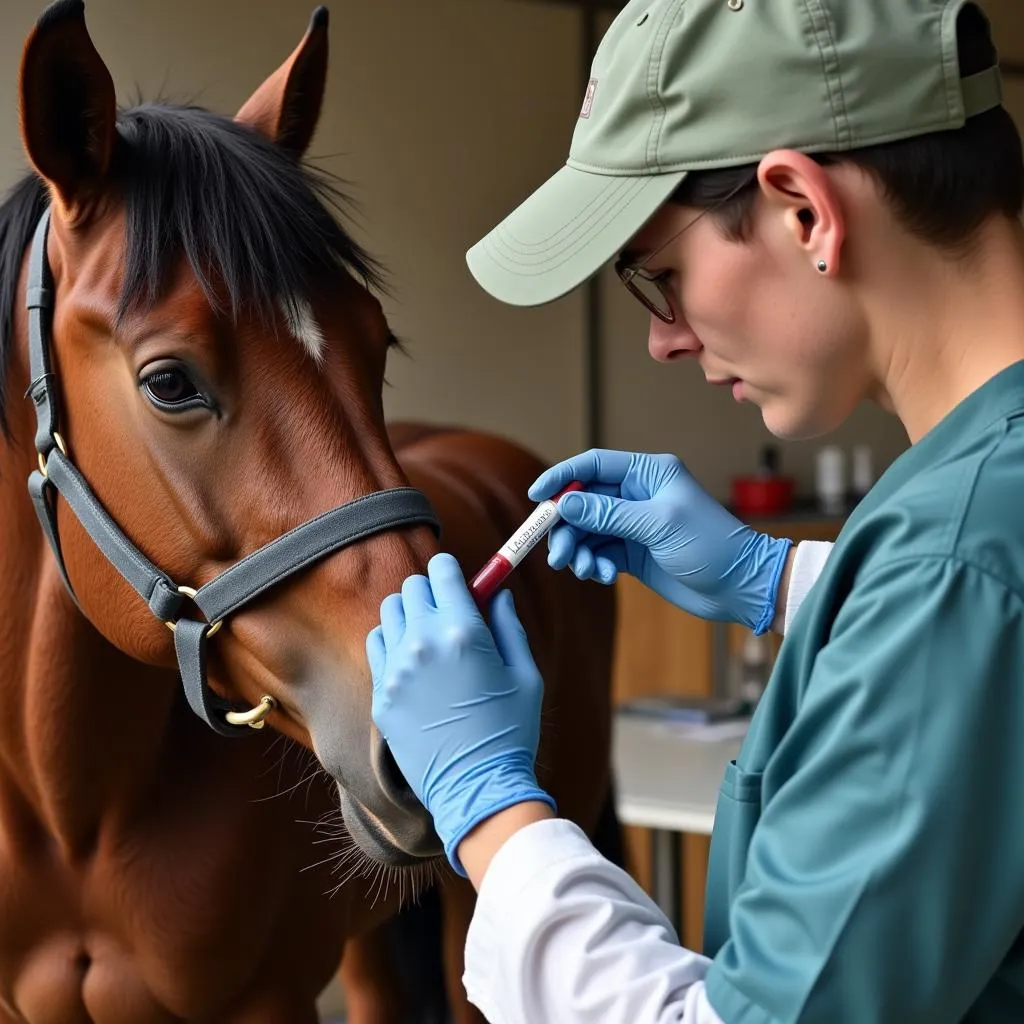Six-panel testing is a crucial aspect of maintaining your horse’s health and identifying potential issues early on. This comprehensive guide will delve into the details of 6 panel testing, covering everything from why it’s important to what it entails and how you can best utilize the results for your horse’s well-being.
Six-panel testing is a blood test that screens for six common equine diseases:
- Equine Infectious Anemia (EIA)
- West Nile Virus (WNV)
- Eastern Equine Encephalomyelitis (EEE)
- Western Equine Encephalomyelitis (WEE)
- Equine Herpesvirus 1 (EHV-1)
- Equine Herpesvirus 4 (EHV-4)
These diseases can have serious consequences for horses, including fever, neurological disorders, respiratory problems, and even death. Early detection through six-panel testing can allow for prompt treatment and improve the chances of a successful recovery.
Why is 6 Panel Testing Important?
“As a horse owner, I highly recommend regular 6 panel testing for all horses,” says Dr. Emily Carter, a renowned equine veterinarian. “It’s a proactive approach to protecting your horse’s health and minimizing the risk of potential outbreaks.”
Here are some compelling reasons why 6 panel testing is essential:
- Early Detection: Identifying diseases in their early stages can dramatically improve treatment outcomes and increase the likelihood of full recovery.
- Preventative Measures: Knowing your horse’s disease status allows you to take preventative measures such as vaccination or isolation, especially if you’re dealing with an outbreak in your area.
- Peace of Mind: Knowing your horse is healthy and free from these diseases provides peace of mind and allows you to enjoy your time together worry-free.
- Biosecurity: 6 panel testing is critical for ensuring the biosecurity of your horse’s environment and preventing the spread of disease to other animals.
- Legal Requirements: In some jurisdictions, 6 panel testing is required for certain activities like traveling or participating in competitions.
What Does 6 Panel Testing Entail?
A six-panel blood test is typically performed by a veterinarian. A small blood sample is collected from your horse and sent to a laboratory for analysis. The laboratory will then send you a detailed report outlining the results.
 Collecting a blood sample for 6 panel testing
Collecting a blood sample for 6 panel testing
Interpreting 6 Panel Testing Results
The results of your horse’s 6 panel test will be presented in a clear and concise report. Each disease will be listed, along with its corresponding test results, indicating whether your horse tested positive or negative for each disease.
If any of the results are positive, your veterinarian will discuss the implications with you and advise on the best course of action, which may include:
- Treatment: Depending on the disease, treatment options may involve antibiotics, antiviral medications, or other therapies.
- Isolation: Isolating your horse can help prevent the spread of disease to other horses.
- Vaccination: If your horse is not already vaccinated against certain diseases, your veterinarian may recommend vaccinations to provide future protection.
How Often Should Horses Be Tested?
The frequency of six-panel testing can vary depending on several factors, such as:
- Age: Foals should be tested soon after birth.
- Travel: Horses that travel frequently should be tested more often.
- Disease Prevalence: If there is a known outbreak of a particular disease in your area, your veterinarian may recommend more frequent testing.
It’s essential to consult with your veterinarian to determine the best testing schedule for your horse.
FAQ
Q: Can 6 panel testing be done at home?
A: No, 6 panel testing requires a blood sample that must be collected and analyzed in a veterinary laboratory.
Q: How much does 6 panel testing cost?
A: The cost of 6 panel testing can vary depending on the laboratory and your veterinarian’s fees.
Q: How long does it take to get 6 panel test results?
A: It usually takes a few days to receive your horse’s 6 panel test results.
Q: What are the signs of an equine disease?
A: The symptoms of equine diseases can vary depending on the specific disease. However, some common signs include:
- Fever
- Loss of appetite
- Lethargy
- Weight loss
- Coughing
- Nasal discharge
- Lameness
- Neurological signs
Q: What should I do if my horse tests positive for a disease?
A: If your horse tests positive for a disease, it’s essential to contact your veterinarian immediately. They will be able to assess your horse’s condition and recommend the best course of action.
Conclusion
Six-panel testing is a crucial part of responsible horse ownership. By providing early detection and preventing the spread of disease, it helps ensure the health and well-being of your beloved horse. Remember to discuss your horse’s individual needs with your veterinarian to determine the best testing schedule and ensure a healthy and happy life for your equine companion.
For any questions, please contact us via phone: 0772127271, email: [email protected] or visit us at: QGM2+WX2, Vị Trung, Vị Thuỷ, Hậu Giang, Việt Nam. Our customer service team is available 24/7 to assist you.